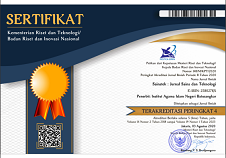Implementation of Library Automation in an Information Retrieving System Using the Apriori Algorithm
Abstract
Keywords
Full Text:
PDFReferences
Abdillah, M. H., Muntahanah, & Sastya Hendri Wibowo. (2021). Penerapan Algoritma Squential Search With Sentinel Pada Aplikasi Katalog Buku Perpustakaan. Jurnal Media Infotama, 17(2), 15–19. https://jurnal.unived.ac.id/index.php/jmi/article/view/1640%0Ahttps://jurnal.unived.ac.id/index.php/jmi/article/download/1640/1231
Anas, A. (2016). Analisa Algorithma Apriori Untuk Mendapatkan Pola Peminjaman Buku Perpustakaan Smpn 3 Batanghari. Jurnal Ilmiah Media SISFO, 10(2), 628–641.
Buwana, R. W. (2022). Peran Blended Librarian dalam Pelaksanaan User Education Berbasis Daring di Perpustakaan IAIN Kudus. Tik Ilmeu : Jurnal Ilmu Perpustakaan Dan Informasi, 6(1), 1. https://doi.org/10.29240/tik.v6i1.3423
Effendi, M. M., Al Khairi, F., & Siswandi, A. (2023). Prediksi Persediaan Barang Tepat Waktu dengan Menerapkan Algoritma Apriori. Bulletin of Information Technology (BIT), 4(2), 152–162.
Febryanto, A., & Lisnawita. (2022). Penerapan Algoritma Sequential Search untuk Mencari Data Siswa Pada Sekolah Menengah Kejuruan Negeri 3 Bengkalis. Prosiding SENKIM: Seminar Nasional Karya Ilmiah Multidisiplin, 2(1), 51–59.
Irfiani, E. (2020). Determination of Book Loan Association Pattern Using Apriori Algorithm in Public Libraries. Jurnal Techno Nusa Mandiri, 17(2), 137–142. https://doi.org/10.33480/techno.v17i2.1681
Mutaki, H. (2017). Implementasi Sistem Automasi Perpustakaan Di Universitas Islam Negeri Sunankalijaga Yogyakarta Implementation of Liberary Automation System At Islamic State University Sunan Kalijaga Yogyakarta. Hanata Widya: Jurnal Manajemen Pendidikan, 6(1), 13–21.
Muttaqin, I., Andryana, S., & Gunaryati, A. (2022). E-Library Berbasis Website Menggunakan Metode Algoritma Apriori Dan Sequential Search. JATISI (Jurnal Teknik Informatika Dan Sistem Informasi), 9(2), 1223–1232. https://doi.org/10.35957/jatisi.v9i2.1909
Nurhadi, A. (2018). Penerapan Metode Waterfall Dalam Sistem Informasi Penyedia Asisten Rumah Tangga Secara Online. Jurnal Khatulistiwa Informatika, 6(2), 97–106. https://doi.org/10.31294/khatulistiwa.v6i2.150
Saefudin, S., & Fernando, D. (2020). Penerapan Data Mining Rekomendasi Buku Menggunakan Algoritma Apriori. JSiI (Jurnal Sistem Informasi), 7(1), 50. https://doi.org/10.30656/jsii.v7i1.1899
Sukmadinata, N. S. (2006). Metode Penelitian Pendidikan (7th ed.). Remaja Rosdakarya.
Syah, A. Z., & Siagian, Y. (2021). Penerapan MOORA pada Evaluasi Kinerja dalam Mengefektifkan Biaya Operasional. Jurnal Media Informatika Budidarma, 5(3), 1090. https://doi.org/10.30865/mib.v5i3.3112
Yoga, S. (2019). Perubahan Sosial Budaya Masyarakat Indonesia Dan Perkembangan Teknologi Komunikasi. Jurnal Al-Bayan, 24(1), 29–46. https://doi.org/10.22373/albayan.v24i1.3175
Yoliadi, D. N. (2022). Pengembangan Sistem Informasi Pengelolaan Perpustakaan (Automasi Perpustakaan) Pada SMP Negeri 1 Padang Ganting. Istinarah: Riset Keagamaan, Sosial Dan Budaya, 4(2), 153. https://doi.org/10.31958/istinarah.v4i2.8705
Yoliadi, D. N., Rumba, S., & Buchory, T. (2023). Challenges and Opportunities for Implementing Library Automation and Visitor Experience in the Era of the Industrial Revolution 4.0. Alfuad: Jurnal Sosial Keagamaan, 7(1), 71. https://doi.org/10.31958/jsk.v7i1.8530
DOI: http://dx.doi.org/10.31958/js.v15i2.8555
Refbacks
- There are currently no refbacks.
Copyright (c) 2023 Dodi Nofri Yoliadi

This work is licensed under a Creative Commons Attribution-NonCommercial-NoDerivatives 4.0 International License.
Indexed by:
__________________________________________________________________________
Sainstek: Jurnal Sains dan Teknologi
ISSN 2085-8019 (print) | 2580-278x (online)
Published by Institut Agama Islam Negeri Batusangkar
Email: sainstek@iainbatusangkar.ac.id
This work is licensed under a Creative Commons Attribution-NonCommercial-NoDerivatives 4.0 International License.















